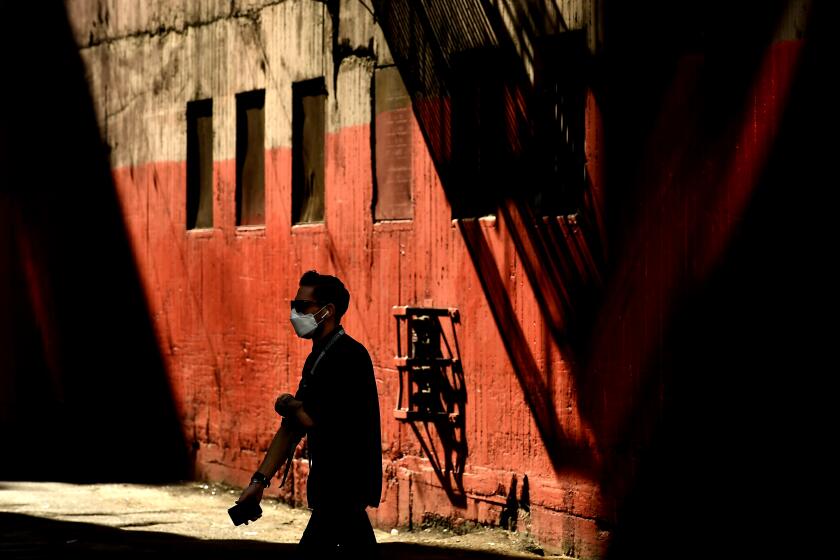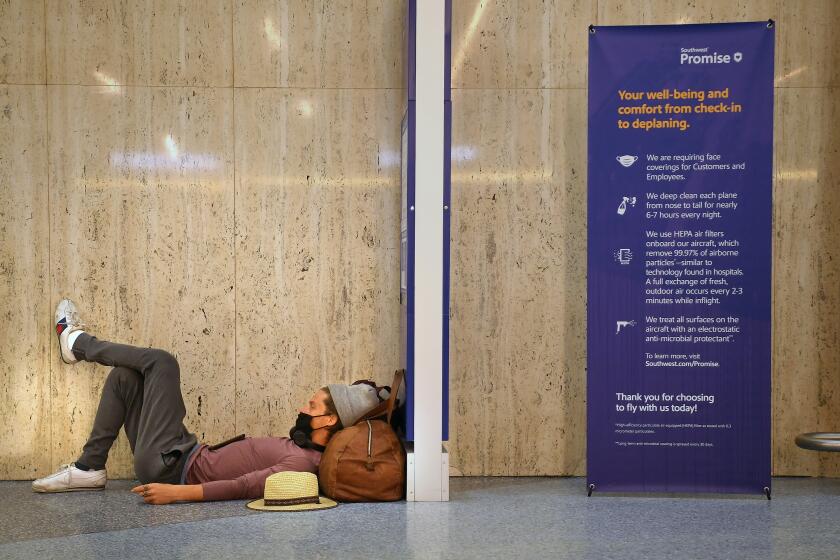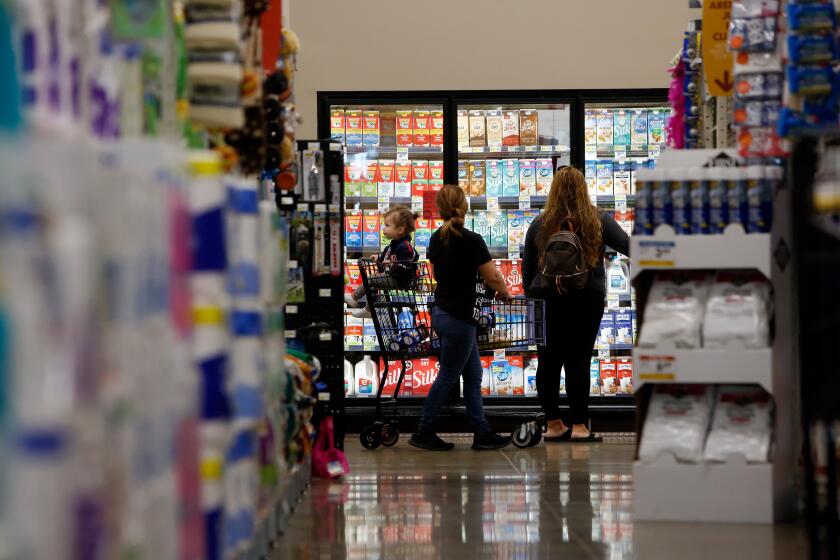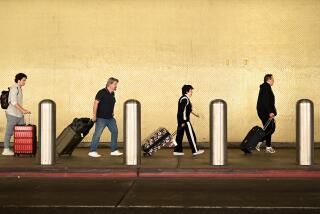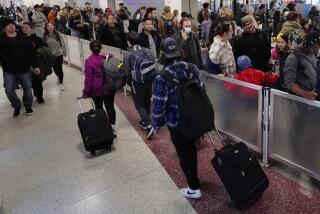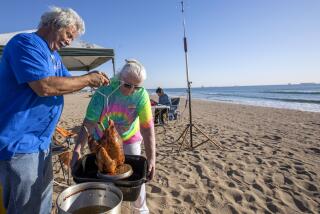CDC’s last-minute advice on travel for Thanksgiving: Don’t do it
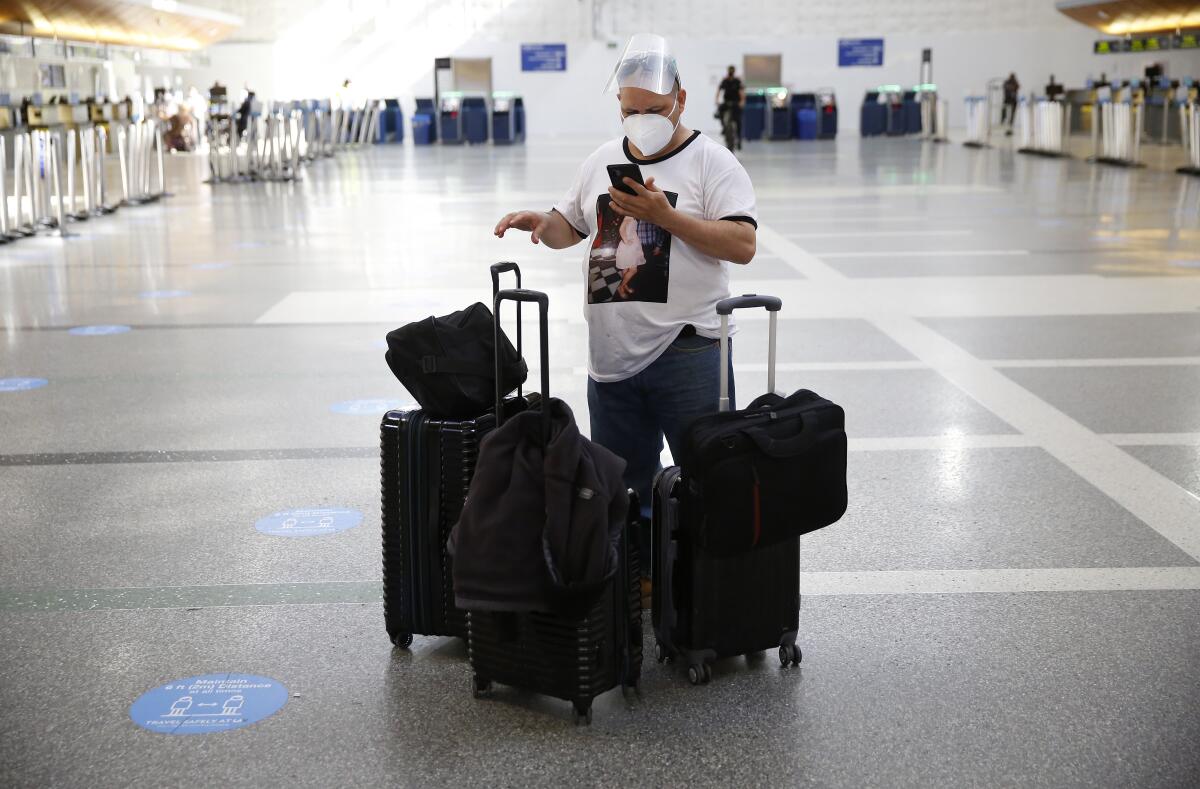
With Thanksgiving a week away, the Centers for Disease Control and Prevention urged Americans to skip holiday travel this year.
The recommendation released Thursday by the CDC was a break from earlier messaging in which U.S. officials have largely declined to issue firm guidance for holiday gatherings, leaving it to American families to decide for themselves whether to risk infection at group events with the COVID-19 pandemic still raging.
The agency’s website suggests that virtual Thanksgivings pose the lowest risk, and that smaller, shorter and outdoor gatherings all help reduce the danger of viral transmission.
Gov. Gavin Newsom has announced a stay-at-home order affecting most of California.
“The safest way to celebrate Thanksgiving this year is at home with the people in your household,” said Erin Sauber-Schatz, who leads the CDC’s Community Intervention and Critical Population Task Force, at a briefing with reporters.
The agency now projects a grim increase in deaths due to the virus over the next four weeks, with 7,300 to 16,000 new deaths likely to be reported in the week ending Dec. 12.
Thanksgiving is the one national holiday when Americans traditionally take a breather and get together with family. Convincing 300 million people to break with that ritual is proving to be a hard sell, especially with inconsistent messages from the nation’s leaders.
The Trump administration has sent mixed signals. The White House announced Tuesday that President Trump would remain in Washington for Thanksgiving, instead of traveling to his Palm Beach, Fla., resort, Mar-a-Lago, his usual holiday destination. Officials didn’t say why he changed his plans. Health and Human Services Secretary Alex Azar on Wednesday urged Americans to celebrate only with their immediate household — a warning that Trump and Vice President Mike Pence have not given.
Officials warned that a new stay-at-home order would be imposed if coronavirus cases and hospitalizations continue to spike over the next few weeks.
“Gathering indoors with people who aren’t members of your household is a high-risk activity for spreading the virus,” Azar said, after previously stopping short of such a warning.
That cautionary tone, though, comes after many Americans have already made their plans and are preparing to travel. Entering the U.S. holiday season, the nation is experiencing its worst surge of the coronavirus yet. Cases are spiking nationally to record levels. The U.S. recorded 148,000 new cases on Tuesday after hitting a record daily total of 190,000 on Friday. U.S. deaths from the coronavirus have surpassed 250,000, including 1,425 on Tuesday. Hospitalizations are at a record level.
Those numbers are likely to get worse. The virus spreads easily indoors, particularly when people are eating and talking, while sitting close together and not wearing masks. And contact tracing efforts are increasingly finding clusters of infections linked to small, private social gatherings, as opposed to the super-spreader events of earlier in the pandemic.
The Centers for Disease Control and Prevention updated its guidance on Thursday, recommending that Americans limit in-person contact and not travel during the Thanksgiving period.
The website advises that virtual Thanksgivings pose the lowest risk, and that smaller, shorter and outdoor gatherings all help to reduce the danger of transmission.
Agency again warns of growing COVID-19 risks and asks Americans to stay home.
Even Anthony Fauci, the influential director of the National Institute of Allergy and Infectious Diseases, has taken pains to avoid telling people what they should do, though he’s clearly signaled the smart move is staying confined to one’s social bubble.
“Each individual family unit needs to make a risk-benefit assessment for what they want to do for the holidays,” Fauci said this week at a New York Times Dealbook conference. “My own family, my daughters, who are adult professional women, as difficult as it is, have made their decision that they want to protect their daddy.” Fauci has said he and his wife will dine alone at home on Thanksgiving.
Other health experts are struggling to advise people how to behave on their holiday, especially following months of stressful social isolation and, for many, economic hardship. Michael Mina, an epidemiologist at Harvard University, said he’s skipping the family gathering but that some of his relatives are not.
“I have had a hard time when people ask me about Thanksgiving,” he said. “It’s just so difficult. I’m also not going to tell my grandpa, who might be in his last year of his life, not to go to my parents’ house for Thanksgiving.”
Caitlin Rivers, a professor at Johns Hopkins University who researches public health preparedness, said federal leaders could be doing a lot more to emphasize the importance of staying home.
“I would like people to understand that key message that it’s not safe to gather with people outside their household,” she said.
Adding to the confusion, advice continues to swing wildly from one extreme to the other, depending on who’s offering it. On Wednesday, White House Press Secretary Kayleigh McEnany questioned government guidelines for the holiday on Fox News.
“I think a lot of the guidelines you’re seeing are Orwellian,” she said. “The American people know how to protect their health, they’ve dealt with for many months, but it’s Orwellian for a place like Oregon to say if you gather in numbers more than six, we might come to your house and arrest you and you get 30 days of jail time. That’s not the American way.”
n New York, Gov. Andrew Cuomo moved to limit indoor gatherings — including on Thanksgiving — to 10 people. But some counties have pushed back, with one sheriff’s office posting on social media that a “constant barrage of Government Regulations and control over your daily lives has added to mass depression.”
As a result, many Americans are still confused. Is it safe to get together if families simply get tested, or test and quarantine? How should parents handle college students coming home from campus? How many people is too many?
Experts offer a range of alternatives about how to celebrate safely.
On Thursday, citing surges in the virus after previous holidays, the American Hospital Assn., American Medical Assn. and American Nurses Assn. issued an open letter asking Americans to scale back holiday gatherings, wear masks and socially distance.
The California Grocers Assn. is urging consumers to plan ahead and shop early to avoid crowds amid an alarming uptick in COVID-19 cases.
To help people gauge the level of risk of their activities, Georgia Tech created an interactive tool to allow people to assess how risky a gathering of any size might be in a particular area.
A few state leaders have issued a simple message: Stay home. In Colorado, where cases have recently surged, Gov. Jared Polis painted a stark picture. Families should self-quarantine aggressively before the holiday, he said, or otherwise opt to keep the revelry within their household.
“The more family members that make the decision to self-quarantine, the more likely you’re not bringing a loaded pistol for grandma’s head,” he said.

